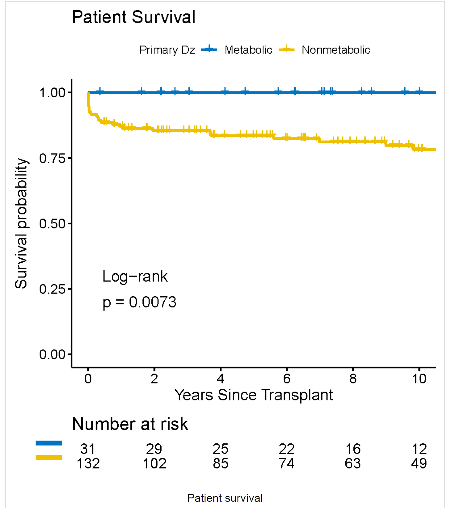Long Term Outcomes of Liver Transplantation for Metabolic Defects in Children
Jillian Wothe1, Heli Bhatt2, David Vock3, Varvara Kirchner3, Srinath Chinnakotla3.
1Medical School, University of Minnesota, Minneapolis, MN, United States; 2Pediatrics, University of Minnesota, Minneapolis, MN, United States; 3Surgery, University of Minnesota, Minneapolis, MN, United States
Background: Liver transplantation was initially developed as a therapy for liver disease known to be associated with a high risk of near-term mortality. As overall outcomes for the procedure have improved. Liver transplantation has evolved into an attractive approach for a growing number of metabolic defects in a variety of clinical situations. Few studies have evaluated the long-term outcomes of liver transplantation in this subset.
Methods: For this study, we retrospectively reviewed charts from children who underwent liver transplant for metabolic liver disease at our academic institution from 2010-2020. We then compared the patient and graft survival in this population to transplants performed in the same era for other liver diseases. We then prospectively administered the PedsQoL Transplant Module survey to the patients who underwent liver transplant for metabolic liver disease to assess their quality of the life.
Results: Thirty-one patients received liver transplantation for metabolic defects. Median age was 4.4 years, 24 patients received whole livers and 7 patients received partial livers. Patient and graft survival were compared to 131 transplants performed during the same era for other liver diseases (Figure 1). The patient survival for the patients with metabolic defects was 100% at 10 years. Preliminary data from the survey supports a high quality of life amongst this population.
Conclusions: Our findings confirm that metabolic liver disease is a highly successful indication for liver transplantation with exceptional outcomes. The long-term survival for children we report demonstrates a realistic expectation of close to normal life potential and potentially high long-term quality of life.
